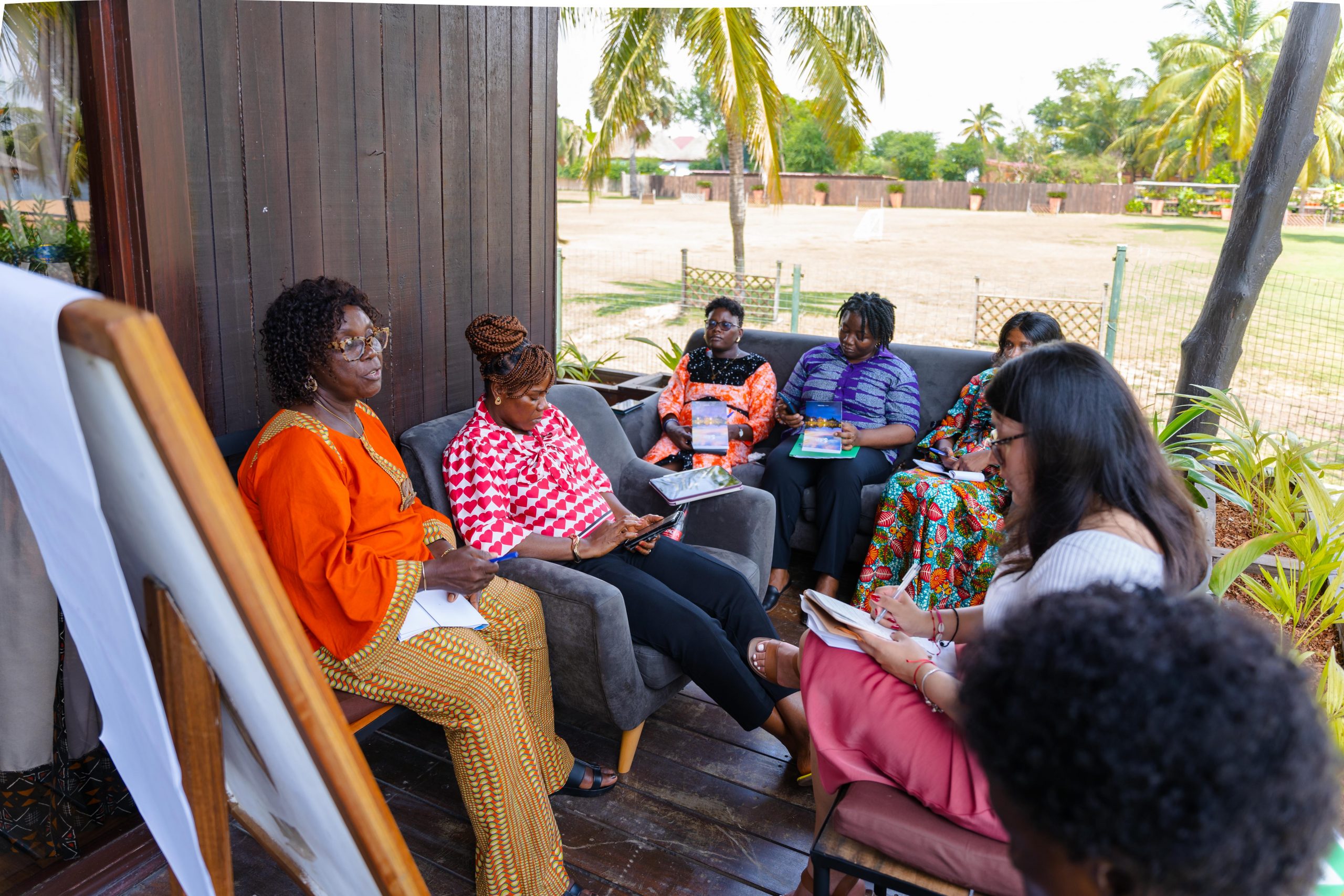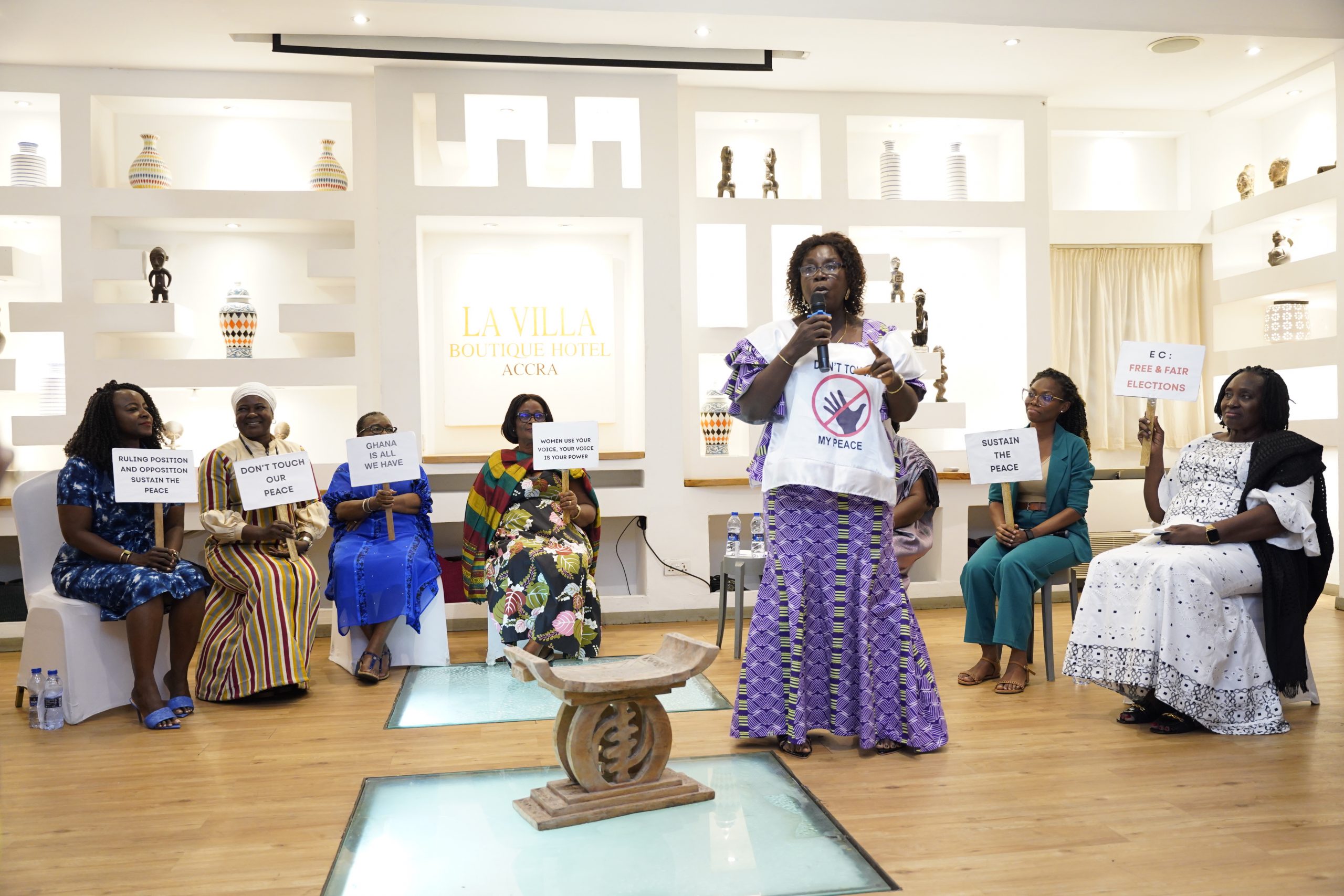
The Global Forum participants from Liberia and Sierra Leone in a workshop breakout session, which Institute Student Fellow Diana Reyes documented.
Photo credit: Illuminous Photography
Between November 1-3, 2024, the Institute on Gender, Law, and Transformative Peace (IGLTP) brought together a group of activists, experts, and policymakers from across Africa to participate in the 2024 Elections Campaigns as Collective Care: A Global Forum. Held in Ghana, which was on the brink of its December 2024 presidential election, the transnational workshop convened experts from across a wide range of areas, all organizing around peace and political mobilization in times of heightened elections. The forum was a ground for sharing the wisdom and range of political strategies employed by gender justice movements across the continent. Over the course of three days and a series of activities, something stood out: the way activists use the law as leverage for social change while also remaining critical of its shortcomings. Across the different countries and organizations, we heard accounts where activists sought the enforcement of existing protective laws, mobilized to change existing legal frameworks, or resorted to courts for protection.
Training Women to Enter Legal and Political Spheres
Agents of change, like forum participant Ms. Bintu Kamara have used the law as a tool to further support the fight for equity, peace, and justice. As a Program Coordinator at the 50/50 Group, an organization that supports women pursuing local politics in Sierra Leone, Ms. Kamara works on ensuring that laws are enacted and enforced by collaborating with other organizations, including the Minister of Gender. Such laws include the Domestic Violence Act, the Constitution, and the Gender Equality Women’s Empowerment Act. The Gender Equality Women’s Empowerment Act of 2022 addresses the gender imbalance in parliament in Sierra Leone by establishing a 30 percent quota—which requires the appointment of women to decision-making positions, including in Parliament, local councils, civil service, and the diplomatic corps. As a result, there are currently up to 42 women in Parliament. Despite this remarkable achievement due to the advocacy of women at the forefront of the movement, Ms. Kamara’s work is crucial in law enforcement and enactment as gender-based violence prevails.
In addition to the lack of law enforcement, women seeking to participate in institutional politics in Sierra Leone face several institutional, cultural, and structural barriers. One of them is gender-based violence in the context of elections, from heightened domestic violence to sexual harassment in the workplace, and the structural barriers that hinder women’s success in politics. Another workshop participant, Ms. Emilia Kamara Jengo, Co-Founder and Program Coordinator at the Women’s Forum for Human Rights and Democracy in Sierra Leone (WOFHARD), has been engaged in activist work that addresses this crucial problem. During the forum, she spoke about the implementation of a project across six districts to train women as political candidates aspiring for the 2023 election.
Similarly, participant Atty. Facia Harris from Liberia shared at the forum that what started as a university-based group to help provide support and peer mentoring for her and her peers in college is now a national organization. Atty. Harris, a gender analyst, women’s rights activist, and co-founder of Paramount Young Women Initiative (PAYOWI) discussed the education programs where she works with young girls through high school clubs and the community. PAYOWI also promotes leadership development and women’s participation programs by working with young women on political education. Through campaigns like “Her Vote Counts,” Atty. Harris has dedicated her time to empowering young girls. Atty. Harris stated, “When we are doing awareness, we reach out to men, we reach out to women, and we reach out to young people. But specifically, we train the young women to be the campaigners.”
The importance of coalition building in advocacy work was stressed throughout the conversation. As a member of the NGO Secretariat of Liberia, Atty. Harris engages in partner work and joint advocacy with other organizations including the Gbowee Peace Foundation. Together they work towards electoral and legal reform for women’s representation in Liberia. As a practicing attorney, she is also actively combating the lack of representation of women in the legal field through a cross-sectional approach that includes the youth, women, and men.

Ms. Etty Weah of the Gbowee Peace Foundation Africa’s “Sustain the Peace” Campaign leads a presentation at the Global Forum in Ghana.
Photo credit: Illuminous Photography
Advocacy Through a Legal Lens
Advocacy, including in the form of grassroots activism, is a tool that can be used to mobilize the law around peace and justice. Ms. Etty Weah, another workshop participant from Liberia, is a grassroots organizer for peace and women and girls’ activism. She leads the Gbowee Peace Foundation Africa’s (GPFA) “Sustain the Peace Campaign,” as well as the “16 Days of Activism Against Gender-Based Violence” campaign. At the workshop, she described the awareness-raising and education work GPFA engages in within villages. “We’ll go out there carrying peace messages, [telling women,] ‘It is your right to register to vote.” Her work also includes the training of women about gender-based violence. As explained by Ms. Weah, they “encourage women to take part in elections, community. Men have been the community leaders, but we are changing that scenario by encouraging our sisters [and encouraging others] to give them a chance.” Ms. Etty Weah’s passion for change, following an agenda centered on peace, was conveyed throughout her presentation at the Global Forum (pictured above).
Atty. Harris and another forum participant, Atty. Naomi Thompson, discussed how they both worked in activist and campaign advocacy spaces for gender justice prior to becoming lawyers. Atty. Thompson, now of the Liberia National Bar Association and the African Bar Association, discussed how she now uses the law as a tool for her advocacy work. After the 2023 election cycle in Liberia, she handled 16 cases, four of which “were women contestants who felt that there were issues that made them not to win or there were irregularities.” She shared that some of the cases were dismissed due to lack of evidence and explained that one significant ruling resulted in a vote recount for one of the women representatives; many irregularities were identified, and the candidate presented substantial evidence. Despite not winning after the recount, Atty. Thompson shared that the candidate “was satisfied that some level of justice had been served, and her plight had been heard.” This remarkable outcome—the recognition of voice and demand—represents a victory for women in politics who have been held back by deeply embedded systemic barriers and those aspiring to hold office. It also sets a crucial precedent, empowering future candidates to come forward with their claims.
Deeply Embedded Structural and Economic Barriers

Atty. Facia Harris, co-founder of Paramount Young Women Initiative (PAYOWI) in Liberia, speaks at the Nov. 2024 Global Forum in Ghana.
Photo credit: Illuminous Photography
The participants pointed to the structural and economic barriers often posed against women during elections, and among them are the high costs for women to run for office and the lack of legal help. Along with the lack of legal support, the structural barriers add to the burden women face during elections. To combat the issue of lack of legal support during this past election in Liberia, Atty. Harris explained how her organization, PAYOWI, set up a public designated space for candidates to acquire legal support on filling up the requirements—one of them being the filing of taxes. From lack of legal support to the economic hardships imposed, bureaucratic barriers hinder women’s political success.
Due to the ongoing efforts of experts in the field of gender justice, laws have been successfully implemented, yet their fight continues as gender-based violence persists—especially during elections—while the law itself is used to reinforce that violence. Ms. Kamara and Ms. Jengo, from Sierra Leone, for example, discussed some of the institutional challenges, particularly the implementation of laws during elections and the limitations of such strategy. Their concerns echoed activists’ limited time to explain the laws to voters, ultimately affecting their participation in the recent national election. In this case, the law functioned as a barrier undermining work toward mobilizing and informing the electorate.
Looking Ahead for Law in Advocacy Work
Through the experiences shared by the participants at the Global Forum in Ghana, key strategies were uplifted in terms of the importance of community, networking, and education. In the context of each country, the role of law played a critical feature in discussions of advocacy: in some cases, it is utilized in unique ways as a tool to further address gender-based and structural violence, which are often real barriers in times of elections, while in other cases, it compromises the hard work to which legal advocates have dedicated their time and effort. Trailblazers like the representatives from Sierra Leone and Liberia remain focused and determined to use their expertise in the legal field to continue their advocacy in dismantling structural, economic, and cultural barriers.
Diana Reyes was a Student Fellow at the Institute on Gender, Law, and Transformative Peace in Fall 2024. Diana will graduate from Brooklyn College in 2025 with a BA in Political Science, with a minor in Sociology and Spanish Translation. She attended the Institute’s Global Forum in Ghana in November 2024.

